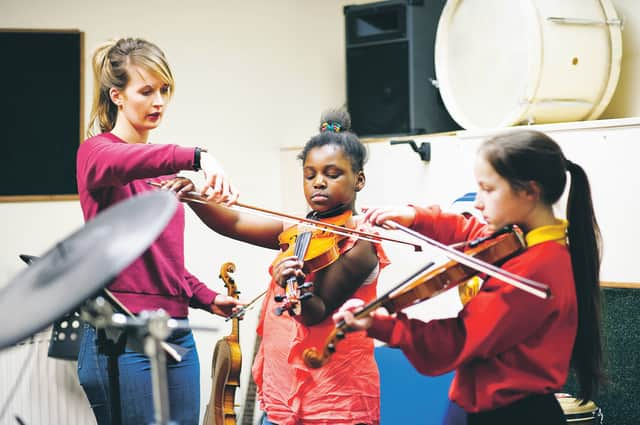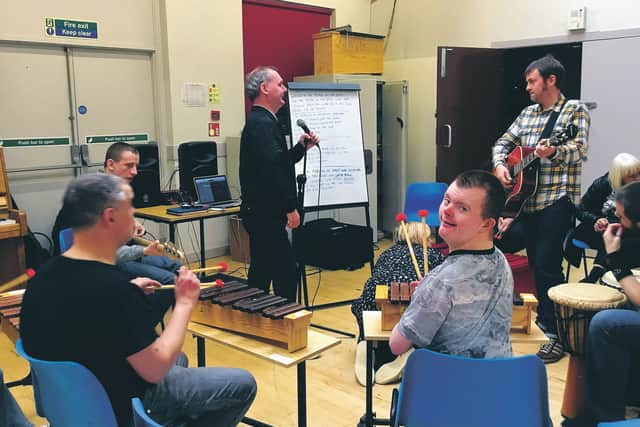How Glasgow’s Beatroute Arts has stayed at heart of the community during Covid


On 16 March 2020, Beatroute’s staff team sat two metres apart and collectively took a moment. The UK Government had just made the first of many daily briefings, pointing to a graph which depicted ‘The Curve’ which we now know would bring horrific loss of life. All the forward planning possible on our part could not have foreseen this; the incoming pandemic and subsequent complete rewrite of every community service currently offered by us, a small but bustling creative commmunity hub situated in the North East of Glasgow, providing daily services for approximately 1,500 local people per year. Confusion was a-bound; what did it all mean? That we would need to shut our building was clear, but the big question was when, and how then would we continue to support our community if we were not physically present? There were no clear guidelines to follow and so, along with the rest of the Voluntary Sector, we looked to one another – to fellow organisations and agencies – for support and information. The Voluntary (or Third) Sector is an incredible thing; the lightning speed with which webinars, information forums, succinctly gathered information around emergency funding sources and best practice emerged was nothing short of impressive. The sector turned on a dime and rallied to the support of communities across the country, navigating the unchartered territories of emergency funding bids (some processes blessedly easy, others quite the opposite) and finding ways to support those most impacted by the lockdown measures which were eventually announced on 23 March.
For Beatroute Arts, this meant finding the fastest and most inclusive way to bring vital services online. To date, the charity has delivered 517 individual pieces of creative community-led activity (music workshops, arts tutoring and mentoring, yoga classes and social gatherings) providing vital tech equipment such as tablets and mobile wifi for those most at risk of becoming socially isolated and offering individual, bespoke support for members (particularly older members) so that they might connect to the groups and classes that make up such a meaningful part of their weekly routine. The importance of such creative provision is already well documented. Pre-coronavirus, research has long spoken of the impact of, and need for arts and culture in a community development and educational context. The Scottish Government Growth Sector Database values the Creative Industries at £4.9 billion, yet music education always limps in last on the list of priorities. The Music Education Partnership Group found that 70 per cent of pupils who receive music lessons pay for them, while an estimated 100,000 go without, as demand outstrips supply. With the emergence of coronavirus, there is an increased need for cultural services – those which connect, educate and support people’s mental health and wellbeing – to be valued equally alongside other vital frontline services. Recently, I received an email from a peer within the sector who questioned whether emergency funding should be directed towards arts organisations such as Beatroute rather than those services providing food, fuel and energy support. I found this question deeply troubling, and although it technically isn’t my question to answer (I default to the funding bodies themselves here and deem/hope them capable of making that judgement) it was perhaps indicative of the long-held opinion of many that the arts are not in themselves particularly important or considered a vital front-line service to those in our communities who are most vulnerable.
‘Time moves slowly now.


Stuck in my humble abode.
Me and my guitar’
Advertisement
Hide AdAdvertisement
Hide AdA haiku written by a local young person during their weekly online song-writing workshop with Beatroute. Indeed, time does move slowly now, and for those ‘stuck in their humble abodes’, services such as Beatroute’s are nothing short of necessary. Adult members would also furrow their brow at the suggestion the services they currently benefit from are in some way superfluous. “I had depression before I joined,” said one member of the yoga group ‘Golden Yogis’ online recently. “I thought I’d do the class for two weeks, make my excuses and leave but that was four years ago! I’ve stopped needing my medication, this is my medicine now”. This got me thinking perhaps rather than considering what additional benefits, both economically and socially, the arts bestow upon society, it would be more helpful for us to consider how life (particularly in lockdown) would be without any form of creative input. The music we listen to, books we read, artwork on our walls, movies we watch, Netflix series we binge and then instantly forget. The list goes on...and yet there has been a marked devaluation and de-prioritisation of creative education and disregard shown towards the makers, thinkers, writers, artists, musicians, designers and performers who create much of what defines us as human beings, both economically and in the societal sense.
So long as Beatroute Arts exists in a post Covid-19 society therefore (or Covid-19 adjacent society) we will continue to advocate for the arts as a vital component of our national makeup. Culture is many things for an area like Balornock (and others like it across Scotland), which faces daily the effects of poverty: it is the opportunity for local people to be the driving force of their community’s identity. It provides opportunities to define who they are in their own voices, whether that voice is found through a guitar, a yoga posture, a lockdown haiku, a piece of art created and displayed in a community centre, library or online platform. This is the cultural heart that is so needed and which has become lost through years of austerity measures, and the slow dismantling of any provision deemed by policy makers not to be an absolute necessity.
It is worth noting that pre-Covid 19, 81 per cent of Scotland’s adult population visited cultural events or places annually (Scot Gov: Scottish Household Survey), clear evidence of how important culture is to the general populace. It might be a visit to The Kelpies with the grandkids, a stroll around the Kelvingrove Art Gallery, or a visit to the local community garden. People shouldn’t be thanking their lucky stars that these cultural experiences exist, in fact by rights citizens of Scotland (whose taxes pay for many of these experiences) really shouldn’t have to. It should go without saying – because the support, recognition and wisdom exists for the arts to be given a place at the table, to be woven into the fabric of our society. At Beatroute, we regularly hear people expressing heartfelt gratitude for the free services we provide, as though they were a rarity that makes me incredibly sad.
It may sound insultingly obvious but I’ll say it none-the-less; a sense of identity, pride of place from a cultural perspective creates waves which are vital to the lives of us all, whether or not we may realise it. Like a drop of ink in water, it spreads in myriad ways to all those for whom previous closed doors now open; opportunity, learning, education, employment and social integration lead to increased confidence, self-esteem, pride; which in turn improves mental health and wellbeing, community connectivity, aspiration and sense of worth and equality. I’d say that’s important. In fact, I’d say it’s absolutely vital. n
Comments
Want to join the conversation? Please or to comment on this article.